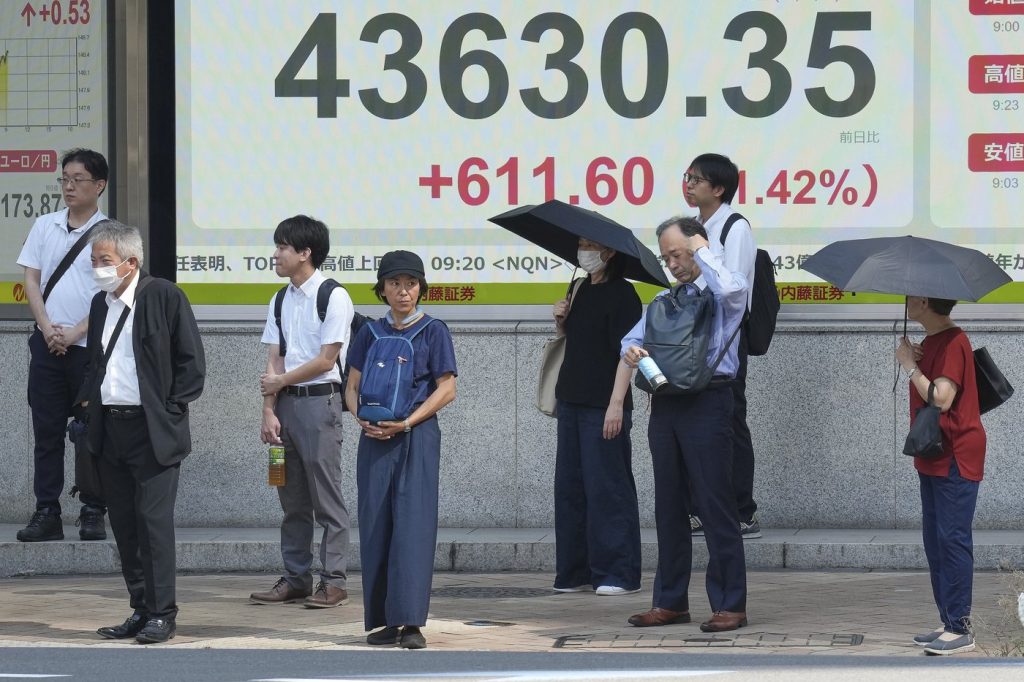Business
Asian Markets Climb as Japan’s Prime Minister Steps Down

Asian shares experienced a boost in trading on Monday, following the announcement that Japan’s Prime Minister Shigeru Ishiba will resign from his role as both prime minister and head of the ruling Liberal Democratic Party (LDP). This news, which came late on Sunday, has added a layer of political uncertainty but was not entirely unexpected. Analysts view Ishiba’s decision as a necessary step towards progress, although the upcoming election for a new party leader is likely to continue influencing market sentiment.
Japan’s benchmark index, the Nikkei 225, rose by 1.4% in morning trading, reaching 43,630.54. Despite the temporary uncertainty surrounding leadership, many analysts believe that the markets will stabilize once a new leader is appointed. Naomi Fink, chief global strategist at Amova Asset Management, noted, “Markets may react short-term to the temporary uncertainty of lame-duck leadership, but this may resolve once a new leader is chosen.”
Other markets across Asia also showed positive movement. South Korea’s Kospi gained 0.2%, reaching 3,211.36. In contrast, Australia’s S&P/ASX 200 experienced a slight decline of 0.3%, landing at 8,845.50. Meanwhile, Hong Kong’s Hang Seng index edged up by 0.3% to 25,487.02, and the Shanghai Composite rose by 0.2%.
In a separate development, Japan’s Cabinet Office reported that the economy expanded at a stronger rate than previously estimated during the first fiscal quarter, with a seasonally adjusted growth of 2.2% annualized. This figure surpasses an earlier estimate of 1.0%, attributed to robust consumer spending and inventory increases.
Wall Street, however, faced a different scenario. Stocks closed lower on Friday as uncertainty loomed regarding the U.S. job market’s performance. The S&P 500 index fell 0.3%, slipping below its all-time high, while the Dow Jones Industrial Average dropped 220 points, or 0.5%. The Nasdaq composite also declined slightly by less than 0.1%. A report from the U.S. Labor Department indicated that American employers hired fewer workers in August than anticipated, leading traders to predict a high probability that the Federal Reserve will cut interest rates at its next meeting scheduled for September 17.
In the energy markets, benchmark U.S. crude climbed by 74 cents to $62.61 per barrel, while Brent crude increased by 80 cents to $66.30 per barrel. Currency trading saw the U.S. dollar rise to 148.20 Japanese yen, up from 147.39, while the euro was priced at $1.1709, down from $1.1723.
As Japan navigates this leadership transition, market participants will be closely watching the developments within the LDP and any potential ramifications for both domestic and international economic policies.
-

 Science3 months ago
Science3 months agoToyoake City Proposes Daily Two-Hour Smartphone Use Limit
-

 Top Stories3 months ago
Top Stories3 months agoPedestrian Fatally Injured in Esquimalt Collision on August 14
-

 Health3 months ago
Health3 months agoB.C. Review Reveals Urgent Need for Rare-Disease Drug Reforms
-

 Technology3 months ago
Technology3 months agoDark Adventure Game “Bye Sweet Carole” Set for October Release
-

 World3 months ago
World3 months agoJimmy Lai’s Defense Challenges Charges Under National Security Law
-

 Lifestyle3 months ago
Lifestyle3 months agoVictoria’s Pop-Up Shop Shines Light on B.C.’s Wolf Cull
-

 Technology3 months ago
Technology3 months agoKonami Revives Iconic Metal Gear Solid Delta Ahead of Release
-

 Technology3 months ago
Technology3 months agoApple Expands Self-Service Repair Program to Canada
-

 Technology3 months ago
Technology3 months agoSnapmaker U1 Color 3D Printer Redefines Speed and Sustainability
-

 Technology3 months ago
Technology3 months agoAION Folding Knife: Redefining EDC Design with Premium Materials
-

 Business3 months ago
Business3 months agoGordon Murray Automotive Unveils S1 LM and Le Mans GTR at Monterey
-

 Technology3 months ago
Technology3 months agoSolve Today’s Wordle Challenge: Hints and Answer for August 19









